VOTER GUIDE
 On Tuesday, June 30, Faith in Public Life and Interfaith Power & Light released a voter reflection guide endorsed by prominent national faith groups and religious leaders. The guide, Democracy, Values & the 2020 Election, addresses urgent issues in the election, including voting rights, climate change, systemic racism in the criminal justice system, healthcare and immigration. The guide, which will be distributed across the country for discussion in diverse faith communities, includes topics for reflection and sample questions to ask candidates Download Full Guide Here
On Tuesday, June 30, Faith in Public Life and Interfaith Power & Light released a voter reflection guide endorsed by prominent national faith groups and religious leaders. The guide, Democracy, Values & the 2020 Election, addresses urgent issues in the election, including voting rights, climate change, systemic racism in the criminal justice system, healthcare and immigration. The guide, which will be distributed across the country for discussion in diverse faith communities, includes topics for reflection and sample questions to ask candidates Download Full Guide Here
Download Spanish-language version of the guide, Democracia, Valores y las Elecciones de 2020
Issues and Questions
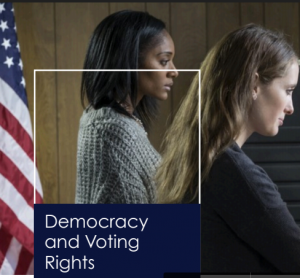 Democracy and Voting Rights (Page 1)
Democracy and Voting Rights (Page 1)
This election is more than a choice between parties and ideologies. An even more fundamental question is at stake: Can we preserve democracy in the face of serious threats to fair elections and fundamental rights?
Questions for Reflection and Candidates
- How do you see democratic values at risk today?
- How do systemic barriers to voting undermine our most sacred democratic values?
- How can your faith community better advocate for stronger voter protections at the state and local level?
- As a candidate, what are your specific plans for protecting and strengthening voting rights?
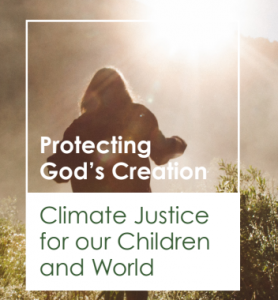 Protecting God’s Creation Climate Justice for our Children and World (Page 2)
Protecting God’s Creation Climate Justice for our Children and World (Page 2)
As people of faith, we believe that responding to the urgent threat of climate change is essential to caring for God’s creation and loving our neighbors. Human activity, primarily the burning of fossil fuels for energy, has thrown
nature out of balance, polluted the air, driven thousands of species of God’s creatures to extinction, intensified catastrophic events such as wildfires and hurricanes, and threatened the lives and livelihoods of our most vulnerable brothers, sisters and neighbors around the world. Scientists tell us we have less than a decade to avoid even more catastrophic consequences.
The United States has a unique responsibility to show moral and political leadership:
- Transitioning our economy away from polluting fossil fuels toward 100% clean energy.
- Honoring the emissions-reduction commitments our nation made at the UN Conference on Climate Change in Paris in 2015, and taking additional actions needed to avert catastrophic global warming.
- Assisting developing nations— who are least responsible for climate change but most impacted by it — in coping with threats such as increased droughts, disease, and sea-level rise by sharing technology and financial support.
Questions for Reflection and Candidates
- What does your faith teach about our responsibilities for the Earth and to others? How are they interdependent?
- Has your faith community made an effort to cut emissions, save energy, or practice environmental stewardship?
- As a candidate, what specific policies do you support to protect God’s Creation and secure a safe climate for our children and future generations?
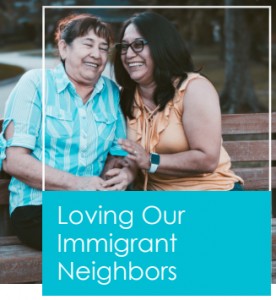 Loving Our Immigrant Neighbors (Page 4)
Loving Our Immigrant Neighbors (Page 4)
Scripture repeatedly makes clear that immigrants must be treated with dignity. Policies that rip children from their parents’ arms, lock people away in inhumane conditions, and ban desperate families from entering the country
should keep us awake at night. As people of faith, we believe that the way we treat our immigrant neighbors is a sign of how we treat God.
Questions for Reflection and Candidates
- How can we replace immoral immigration policies that tear families apart and cause trauma with an immigration system that values families and affirms the dignity of allv people?
- What can we do to heal the wounds inflicted on immigrant communities by political rhetoric that portrays them as a dangerous “other?”
- If there are immigrants in our community who are feeling isolated and under threat, how can we show support and build connections?
- As a candidate, what will you do to defend the dignity of all immigrants, and how will you further policies that keep families together?
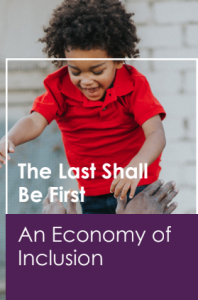 The Last Shall Be First An Economy of Inclusion (Page 5)
The Last Shall Be First An Economy of Inclusion (Page 5)
Our economic systems should work for all Americans, not only the wealthiest few. This is a matter of justice and
human dignity. All religious traditions recognize that charity is essential to care for the most vulnerable, but helping our neighbors in poverty also compels us to address its root causes. “Charity is no substitute for justice withheld,” St. Augustine observed centuries ago.
Questions for Reflection and Candidates
- What can we do to ensure that all Americans are able to provide for their families and live with security and dignity?
- How do we create a just tax system that is fair to all Americans, including working families who are trapped in poverty?
- Why does the United States lag behind most developed countries when it comes to providing paid sick leave and paid family leave?
- As a candidate, what are your specific plans to ensure workers have living wages and economic security while the coronavirus pandemic continues, as well as for the long term?
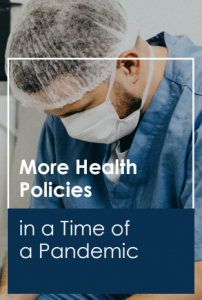 More Health Policies in a Time of a Pandemic (Page 7)
More Health Policies in a Time of a Pandemic (Page 7)
Despite our nation’s stated values of life and equality, the United States is the only industrialized country in the world that does not guarantee its residents universal access to health care. This is a failure of political and moral imagination – especially in a time of pandemic.
Questions for Reflection and Candidates
- How can people of faith be most effective in using our stories, congregations and power to advocate for health care reform?
- What do you struggle with the most when it comes to our healthcare system?
- How has the COVID-19 crisis impacted your community? What policy solutions can keep us all safe and remedy racial and economic inequalities in your community?
- As a candidate, what are your specific plans for making sure that quality,
affordable health care is available for all?
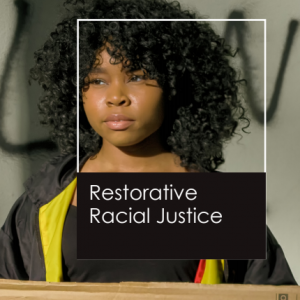 Restorative Racial Justice (Page 9)
Restorative Racial Justice (Page 9)
Justice and redemption are at the very heart of faith. Restorative justice begins with listening to and empowering communities that have been exploited, excluded and denied equal representation and freedom. The evil ideology of
white supremacy shaped our nation from its founding and continues to impact policies and communities today, especially in the criminal justice system. The killings of Ahmaud Arbery, Breonna Taylor, George Floyd and so many other Black people, Indigenous people, and other people of color, has provoked a growing, multi-racial moral movement for accountability and systemic reforms for racial justice.
Questions for Reflection and Candidates
- How can we dismantle the evil ideology of white supremacy in our culture and political systems?
- What can be done to end racial profiling and police violence against people of color?
- What steps can be taken to ensure formerly incarcerated people have voting rights and fair access to employment?
- As a candidate, what will you do to ensure racial justice is prioritized in the criminal justice system?
- How do we build safe communities for everyone, particularly people of color?
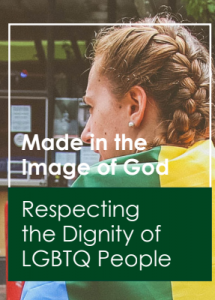 Made in the Image of God: Respecting the Dignity of LGBTQ People (Page 11)
Made in the Image of God: Respecting the Dignity of LGBTQ People (Page 11)
All people have inherent dignity because everyone is created in the image of God. Our gay, lesbian, bisexual and transgender family members, neighbors and co-workers deserve equal rights, and to live without fear or discrimination.
Questions for Reflection and Candidates
- How can your faith community more fully support the equal dignity of LGBTQ people in your state and local area?
- What are the greatest threats to LGBTQ people in your community and the nation?
- As a candidate, what are your specific plans to ensure that LGBTQ people have equal rights and are treated with dignity
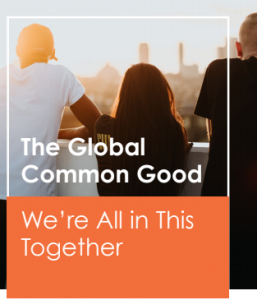 The Global Common Good: We’re All in This Together (Page 12)
The Global Common Good: We’re All in This Together (Page 12)
What does it mean to love our neighbors as ourselves in a globalized world? The health and future of our country and
communities are interconnected to the health and security of other nations. Our fates are bound up in what Rev. Martin Luther King, Jr., called “an inescapable network of mutuality.”
Questions for Reflection and Candidates
- What policies do you think are most important for creating security for your family and community?
- What role should the United States play in the world to help build global peace and security?
- How can your faith community advocate for policies to create a more peaceful world?
- As a candidate, what programs and policies would you prioritize to help build secure communities and a peaceful world?

A Note of Thanks to Sen. Heinrich for Supporting Methane Initiative
/in Campaigns, Faithful Citizenship, Featured Articles, NEWS, NMIPL in the News /by admin“The U.S. Senate has taken a step toward more vigorously regulating climate-warming methane leaks from the oil and gas industry, a move supporters say is key to achieving President Biden’s ambitious climate goals,” Read article, “Senate Votes To Restore Regulations On Climate-Warming Methane Emissions” (National Public Radio)
2021 Legislative Scorecard from Climate Advocates Voces Unidas (CAVU)
/in Campaigns, Faithful Citizenship, NEWS /by adminThe 2021 New Mexico legislative session concluded Saturday. Legislators passed important policies that bring climate solutions to communities grappling with the worst impacts and more tools for regulators to protect our health from pollution.
Our top priority this session was to support efforts to increase critical funding to our energy, environment departments. Thanks to faithful advocacy by folks like you, a broad coalition of environmental organizations, and committed legislators – we were successful!
There’s more work to be done, but together, we made progress. Read all the details in the coalition’s press release.
Called “revolutionary” during a legislative committee hearing, Sustainable Economy Task Force (SB 112) represents a significant shift in how our state will address economic diversification by focusing efforts on sustainable sources of income and economic growth. In other words, SB 112 is a step off of the “boom and bust” budget roller coaster toward a more sustainable and equitable economy.
Now SB 112 and the rest of the wins on the Legislative Scoreboard are headed to Governor Michelle Lujan Grisham for her signature and veto. Ensure Governor Lujan Grisham knows you support SB 112 and the other critical bills that the Legislature passed to act on climate and protect our health!
New Mexico’s authority to set strong clean air, hazardous waste protections a matter for Our Common Home
/in Campaigns, Faithful Citizenship, Featured Articles, NEWS /by adminBy Sr. Rose Marie Cecchini, MM,
Office of Life, Peace, Justice & Creation, Catholic Charities of Gallup Diocese
We live in a beautiful state. We live in a place where ancient and alive cultures continue to teach and remind us that we must care for sacred land, water and our communities. We are to care for our brothers and sisters and Our Common Home. There is wisdom in these ethical values, and yet we are not listening.
For too long, antiquated state laws have limited the regulatory tools available to protect communities from rising threats to our air quality, to our drinking water and our climate. The state and local agencies tasked with protecting our health are hampered by laws that don’t allow them to adopt regulations that are stronger than federal standards.
That’s a problem, especially considering the federal government has rolled back or eliminated dozens of public health and environmental protections over the last four years. New Mexico’s air quality is deteriorating and recent news stories have focused on public health threats from contamination of our groundwater and a legacy of environmental contamination. Pollution poses a serious threat to the health of all New Mexicans but the impacts are not equal – children, Native Americans and those living in poor, rural communities are hardest hit. These are our brothers and sisters. State environmental agencies need the authority necessary to address urgent challenges including the legacy of abandoned, unremediated uranium mine sites, exposing communities to radioactive contamination of water, land and air; the Delaware-size methane cloud over the Four Corners area of the state impacting climate change.
But we are always given opportunities to begin afresh. This past week, the Senate Finance Committee voted to move Senate Bill 8 forward. SB 8 would empower the Environmental Improvement Board and local air quality boards to better respond to the problems associated with industrial waste and pollution and adopt critical pollution and hazardous waste regulations that go beyond federal standards.
In New Mexico we do have the power to care for one another. We simply cannot rely on the federal government to make the right decisions for us, and our local and state agencies should have the authority to adopt strong public health and environmental protections now for our communities and future generations to come.
In addition to allowing stringent air quality standards, SB 8 would allow the state to consider strong, enforceable limits on emerging groundwater pollutants such as PFAS. According to the New Mexico Environment Department, there is “evidence that exposure to some PFAS chemicals can lead to adverse health effects such as increased cholesterol, reproductive problems and cancer.” PFAS are found in a wide variety of products “including food packaging, nonstick pans and aqueous film forming foams (AFFF) used to extinguish fuel-based fires.”
Senate Bill 8 also would strengthen cleanup standards at polluting facilities like the hazardous waste deposited around Los Alamos National Lab from plutonium processing where local officials worry they don’t have standards necessary to protect drinking water. And it would allow the state to address cleanup at other sites, such as Sandia National Laboratories and Kirtland Air Force Base.
We appreciated Senate Finance moving this bill forward. Gallup residents and communities across New Mexico will benefit greatly from public health protections that will be made possible by Senate Bill 8. It is our moral and ethical responsibility to be good neighbors to one another. We call on the State Senate and House to approve Senate Bill 8 as soon as possible and give New Mexico the authority and flexibility it needs so that we can choose life with dignity, health, right livelihood and care for our communities.